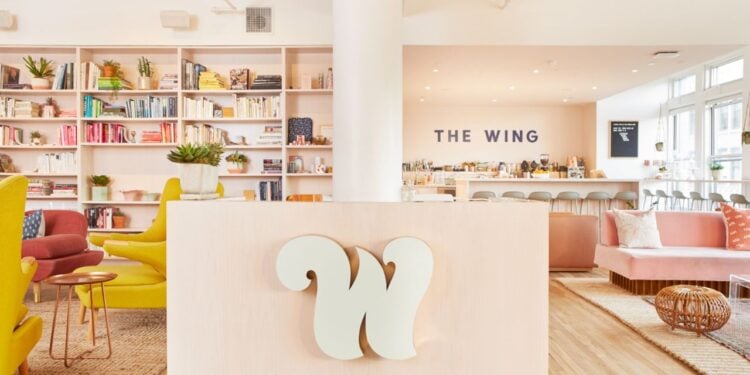- After a few tumultuous years, The Wing, a female-centered coworking space, was closed down by its parent company IWG on Aug. 30. The announcement cited financial issues brought on by the pandemic.
- In 2020, the company faced major criticism over its lack of inclusivity for all women and nonbinary people. Employees of color also accused leaders of discrimination in the workplace.
- There are challenges associated with operating a coworking company that limits and restricts its market. The idea of a female-focused, empowering coworking space seemed great, until it wasn’t.
After a few tumultuous years, The Wing, a female-centered coworking space, has been closed down by its parent company — IWG. Some investors were notified on Aug. 30 of The Wing’s decision to close its doors immediately.
IWG told The Wing’s members that they could have access to IWG’s U.S. locations for use through the end of September.
Originally opened in New York in 2016, The Wing expanded to locations in Chicago, Los Angeles, and San Francisco. At its height, The Wing was reported to have about 12,000 members — and another 9,000 on the waiting list. Joining The Wing cost most clients about $2,500 to $3,000 a year.
Led by founders Audrey Gelman and Lauren Kassan, The Wing opened its first space in Ladies’ Mile (in NYC) where upper-class women would go shopping in the 19th century. The Wing showcased a pink and Instagram-worthy aesthetic and a sense of female political angst around the time of the political defeat of Hillary Clinton, which brought it massive popularity.
For-profit feminism was in, and so was a sense of female oppression and belonging.
WeWork invested $28 million into The Wing in 2017, and by the end of 2019, The Wing had raised more than $100 million from venture capitalists and celebrity investors.
Hurtling down the road to societal and economic success, The Wing ran into a pretty hefty speed bump: People began to express their opinion that The Wing’s values did not match up with its working conditions.
In 2020, the company faced major criticism over its lack of inclusivity for all women and nonbinary people. Employees of color also accused leaders of discrimination in the workplace, leading founder Audrey Gelman to step down as CEO.
What else went wrong?
On August 30 of this year, members of this coworking space were sent an email that read, “With the backdrop of the Covid pandemic and increasing global economic challenges, we have been unable to recover and grow from the level of active membership and event activity necessary to run a financially stable operation.”
There are known challenges associated with operating a coworking company that limits and restricts its market. While the idea of a female-empowered coworking space seems great, it seems there wasn’t enough demand for this type of space.
On the business side, industry leaders and coworking operators must make sure that the market they wish to reach matches their costs on a competitive basis, and the total addressable market has to be worth the investment to achieve scale. It seems that perhaps The Wing’s did not…at least enough to be competitive.
Behind the scenes, IWG bought a majority share of The Wing last year. This year they’re closing down and the clientele will go to IWG.



 Dr. Gleb Tsipursky – The Office Whisperer
Dr. Gleb Tsipursky – The Office Whisperer Nirit Cohen – WorkFutures
Nirit Cohen – WorkFutures Angela Howard – Culture Expert
Angela Howard – Culture Expert Drew Jones – Design & Innovation
Drew Jones – Design & Innovation Jonathan Price – CRE & Flex Expert
Jonathan Price – CRE & Flex Expert












